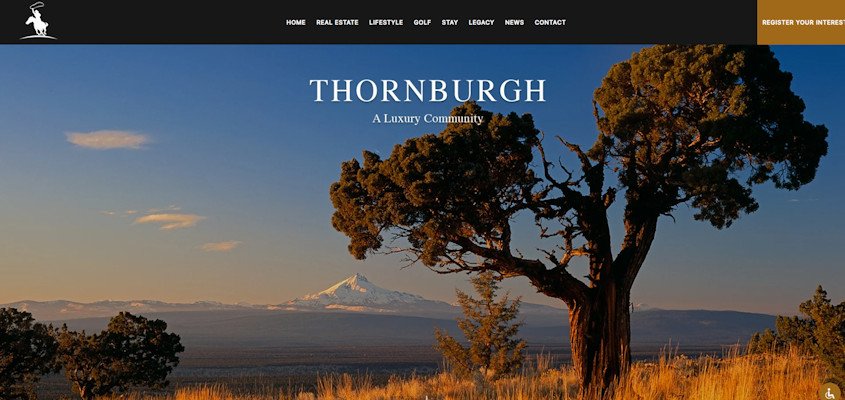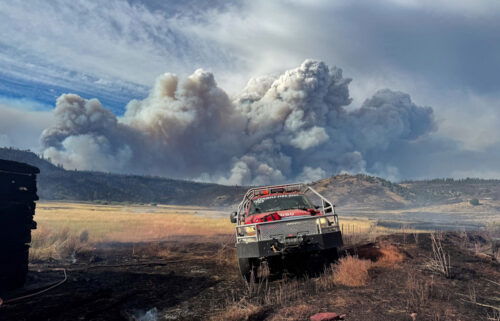Warm Springs Tribes file appeal to press their case against Thornburgh Resort; developer responds, defends plans

REDMOND, Ore. (KTVZ) -- About two decades into a land-use fight over permission to build the Thornburgh Resort west of Redmond, a relatively new participant is pressing its case: the Confederated Tribes of the Warm Springs, who claim their treaty rights, knowledge and concerns were cast aside -- which the developer denies.
The state Land Use Board of Appeals upheld Deschutes County commissioners' approval of a modified fish and wildlife plan for the resort, which is pressing ahead with site preparation work.
We have their full statement on their recent appeal of that unfavorable ruling by LUBA,, and a response provided to NewsChannel 21 by resort developer Kameron DeLashmutt.
"The Confederated Tribes of the Warm Springs Reservation of Oregon recently filed a brief with the Court of Appeals of the State of Oregon asking it to send back the January 12 decision of the Land Use Board of Appeals to address issues that the Tribe has raised in connection with the proposed modification of Thornburgh Resort’s Fish and Wildlife Mitigation Plan.
"In its filing to the State Court, the Tribe asserts that its 1855 Treaty rights and Indigenous knowledge concerning its oversight of Deschutes Basin waters and treaty-protected native fisheries was overlooked and marginalized in the public process.
"The brief further describes how the decision process was controlled by the Thornburgh Resort in a way that ensured the Board of Deschutes County Commissioners did not meaningfully engage with the Tribe’s expert information about the Deschutes Basin fish resources, which are protected by its 1855 Treaty. It also explains how the Land Use Board of Appeals followed suit by failing to recognize the Tribe’s scientific and indigenous expertise and to engage in any meaningful way with the Tribe’s evidence.
WHY:
"The Tribe and its members are a “salmon people” for whom fishing is “not much less necessary to [their] existence … than the atmosphere they breathe” (See United States v. Winans, 198 US 371, 381 (1905)). The 1855 Treaty is federal law and guarantees the Tribe the right to take fish throughout the Deschutes Basin. It also requires that states, including Oregon, ensure there is a harvestable population available to the Tribe. The land use planning process to approve the 2022 Fish & Wildlife Mitigation Plan wholly failed to consider whether the plan violates the fishing clause of the 1855 Treaty.
ADDITIONAL INFORMATION:
"In its brief submitted to the State Court on Friday, the Tribe explains how the Land Use Board of Appeals ignored six critical issues brought forward by the Tribe:
- The likely impairment of the Tribe’s treaty-protected fish resources caused by Thornburgh Resort’s proposed groundwater pumping as described in the 2022 Fish and Wildlife Mitigation Plan.
- The 2022 Fish and Wildlife Mitigation Plan’s potential damage to the Pelton Round Butte Hydroelectric Project’s Fish Passage Plan, which aims to fully utilize the available habitat and production capability in the Deschutes River and its tributaries.
- Whether it is possible to reconcile the anticipated impacts of the 2022 Fish and Wildlife Mitigation Plan groundwater pumping on the Crooked River. According to the Deschutes Basin Habitat Conservation Plan, the lower Crooked River is important to steelhead reintroduction and irrigation systems are a land use activity that can negatively affect summer steelhead by altering seasonal flows and increasing summer water temperature.
- According to the same Deschutes Basin Habitat Conservation Plan conclusion, whether it’s possible to address the irrigation season effects on the Crooked River that could delay or prevent salmon and steelhead reintroduction success and potentially result in reintroduction failure.
- The interrelationship between the proposed 2022 Fish and Wildlife Mitigation Plan and the Deschutes Basin Habitat Conservation Plan and how their respective conservation/mitigation measures ensure the protection fish resources in the Deschutes River, Whychus Creek, and the Crooked River.
- The Tribe’s concern about the Thornburgh’s water modeling assumptions, specifically its unease about the models being based on a 2016 water year, which is before the requirements of the Deschutes Basin Habitat Conservation Plan dramatically altered the surface water flows throughout the Deschutes Basin.
Robert A. Brunoe, Secretary Treasurer/CEO of the Confederated Tribes of Warm Springs, said: “The Deschutes River and its tributaries are in our homelands, and we have lived and fished on these waters since time immemorial. The land and water impacted by the 2022 Fish and Wildlife Mitigation Plan lies within our ceded territory where we retain treaty-protected rights to take fish and to have fish to take.
"Our Tribal knowledge – both scientific and cultural – is essential to deliver a healthy fishery for our people. The Deschutes County Board of County Commissioners, and then the Land Use Board of Appeals, clearly overlooked that our expertise, voice and knowledge isn’t optional in their decision-making processes.
"We’re asking the State Court to correct those unfortunate decisions in order to respect our treaty rights, co-management responsibilities, and sovereign interests when it comes to the fish resources of the Deschutes Basin.”
###
"The Confederated Tribes of the Warm Springs Reservation of Oregon is a federally-recognized, sovereign Indian tribe occupying the Warm Springs Reservation, which was reserved for its exclusive benefit by an 1855 Treaty with the United States. The Reservation stretches from the summit of the Cascade Mountains to the cliffs of the Deschutes River in Central Oregon."
--
Here is Kameron DeLashmutt's response to the Tribes' statement:
"To put the Tribes' claims into context, it’s important to know the action the Tribes is appealing is Thornburgh’s voluntary agreement not to build an approved golf course, to eliminate other water intensive amenities, and take other conservation steps in order to reduce the resort's water consumption by 35%. Thornburgh did so because it believes water is a vital resource, one that we should all care for and steward. We are taking extraordinary steps to do so.
"Integral to this reduction in water usage were vast improvements to the resorts Fish and Wildlife Plan. Thornburgh’s original mitigation plan, which was approved in 2018 allows for the use of much more water. That plan, as is the approval to build another golf course, is still valid, and in effect until it is replaced with the current plan, to occur following resolution of the Tribes appeal.
"Once implemented, the new plan will not only reduced water usage but will deploy mitigation in a manner benefiting to the fishery resources in the Deschutes Basin. To fully understand this Thornburgh retained a professional team of scientists, fish biologists and hydrologists to study the effects of our revised plans. The scientists concluded the Thornburgh plan provided a net benefit to the fisheries resource. Dr. Dr. Lucius Caldwell, PhD in his analysis of the efficacy of the 2022 FWMP on fisheries stated:
"In conclusion, the findings presented above indicate that the combination of planned groundwater pumping at Thornburgh Resort, and the associated mitigation planned to offset this pumping as described in the 2022 Fish and Wildlife Mitigation Plan (NCI 2008; Newton 2022), appear to be a net benefit for both fish habitat quantity and quality at all sites evaluated and would result in no net loss of fish habitat quantity or quality."
"There was no expert evidence submitted to the contrary and the Tribes did not show how Thornburgh benefitting the fisheries resource would (or could) impair any treaty rights that may have.
"During the process, Thornburgh met with and listened to the Tribes. When the Tribes needed more time to assess the revised plan, Thornburgh granted an additional 30 days to study the plan, the science behind it, and to consult with the experts who analyzed it. When the Tribes expressed general concerns about the Crooked River, Thornburgh inquired as to what types of actions they would like to see done. We then put together a partnership with the Crooked River Watershed Council (CRWC) to create a mitigation fund to address the actions the Tribes felt were important.
"In response: the Tribes Natural Resource Manager, Mr. Austin Smith, stated in a letter to the Board that the Tribes supported the creation of a fund “focused on improving the ecological function of the Crooked River to benefit aquatic and aquatic-dependent species, including but not limited to, its treaty protected fisheries that depend on the Crooked River for their survival.”
"Thornburgh did not and could not control the land use process any more than the Tribes could. As you can see, we met with, listened to, and, in partnership with the CRWC, will be voluntarily supporting the preservation of the Crooked River Watershed for decades to come. We are all in agreement that water is a precious resource. That said, the rules regarding land use procedures are clear about what each party can do and when they need to do it. The same rules govern all parties.
"Thornburgh’s partnership with the CRWC was not required, nor was it taken into account by the (Deschutes County) Board of Commissioners when determining Thornburgh’s mitigation plans met the required standards. It is also in addition to the actions Dr. Caldwell determine would result in benefits. It is purely voluntary and part of our ongoing commitment to steward the resources of the region and part of our dedication to be the most ecologically friendly, and environmentally sensitive major community in the west, if not the entire US."



